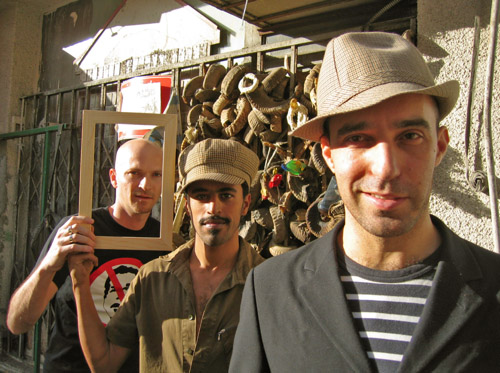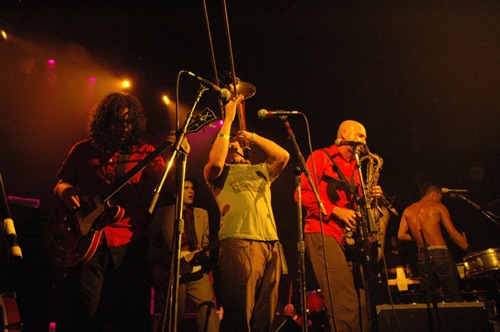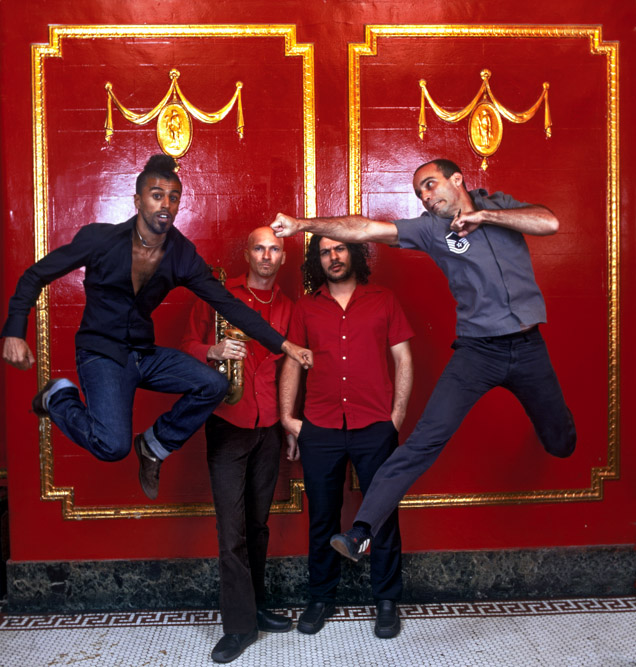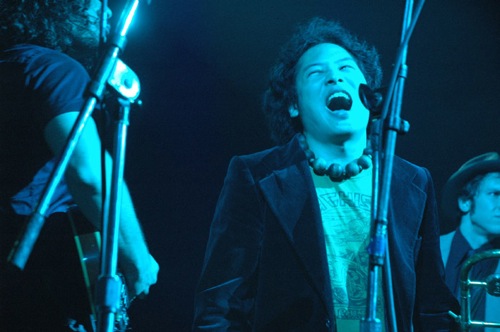The three main members of Balkan Beat Box—Tomer Yosef (vocals and percussion), Ori Kaplan (saxophones) and Tamir Muskat (drums and programming)—are Israeli Jews who grew up exposed to jazz, Eastern European folk, klezmer and Arabic music. In 2004, as part of gypsy-punk band Gogol Bordello, Kaplan and Muskat recorded Gogol Bordello vs. Tamir Muscat with frontman Eugene Hutz. The record influenced Balkan Beat Box’s sound but with their self-titled debut and second album, Nu Med (2007), they’ve mixed all their influences to create their own voice. Balkan Beat Box will perform at a benefit for Friends of the IDF on Saturday, December 5 at the Metropolitan Pavilion in Manhattan. Click here for tickets.

What are some of the craziest, strangest, or most surprising things that have happened on tour?
TAMIR: Playing to 35,000 people at Kikar Rabin in Tel Aviv. The show was happening at the ‘black out hour,’ when the whole world took all lights down for one hour to save on energy. That’s when we went on stage. [For power we used] falafel oil and people pedaling on stage . . . Tel Aviv took a big risk at the time taking BBB as a headliner for the night: No one was sure how many people would come only for BBB. About an hour before the show, we saw that the whole area was completely jammed with traffic, and we knew we would have a special night. 35,000 people was about three times more than expected. That was the night that changed BBB’s status in Israel. We played very well and felt that extra magic in the air. [Also] playing to 50,000 people in Mexico City. Mexico was kind of the same story. We did a double bill with Asian Dub Foundation. Great band. It was our first time in Mexico as a band and the turnout was super surprising. Zocalo Square is one of the most beautiful places and a lot of important historical moments happened there, so it felt very powerful singing ‘Ramala /TLV’ up there.
As far as road action, well, the super interesting stuff cannot be revealed, but let’s see . . . most of the BBB shows end up with the crowd on stage. I’m talking like a packed stage of fans, so we see pretty wild stuff . . . mmm . . . a BBB fan tattooed her arm with our logo (kind of freaky), and our tour manager, Owen, danced naked on stage. (Don’t know what he was thinking, but since that night, things are not the same anymore.)

Photo by Miao Wang
Where do you live now?
TOMER: Tel Aviv, Israel.
TAMIR: Tel Aviv, Israel.
ORI: Vienna, Austria.

Photo by Seth Kushner
How is the music scene it Tel Aviv? What are some of your favorite Israeli bands and musicians right now?
TOMER: It’s a cool scene if you know where to look. I’m doing my own projects and solo album in Israel and I’m part of that scene—there are a lot of talented musicians and artists. My favorite at the moment is The Walking Man, a solo project by Gilad Kahana.
So you officially have three albums, but the last one is a remix of your second album. Do you have plans to start recording a new one?
TOMER: We just finished our third album. It’s been an amazing experience. We recorded it in Belgrade and Tel Aviv and created a new sound for it with a different attitude than the last two albums. The plan is to release it sometime in the coming three months . . . I think we got to a point where Tamir, Ori and myself are working in deep and feel natural to have songs that are more then just a dance vibe—a bit darker but still happy, as we are.
ORI: It’s been a fun album to make, we spent four days in Belgrade recording with several musicians; we taught them our music. It was a full interactive experience. Unlike some DJs who might record a gypsy band and add a beat, we came with [written] scores and oral scores, and it’s obvious when you hear the album that it’s used in an interesting way: interwoven into our writing and concept.
Do you know what the new album will be called?
TOMER: Not 100 percent sure yet but we’ll [probably] call it ‘Blue-Eyed Black Boy.’
You have covered such a wide chunk of the musical spectrum—hip-hop, dub, reggae, dancehall, klezmer, jazz, rock, industrial, gypsy, Arabic, and the list goes on . . . When you look ahead, is there any musical genre, style or approach that you haven’t yet tried but would like to?
ORI: The reality is that we are soaked in all these styles and they flow naturally in us. So we never think, ‘Let’s take this and that.’ We just fly with what we feel and [are] inspired by at that moment. The mixture of Tomer, Tamir and myself is such that we speak in what is already a ‘BBB aesthetic’—we know immediately what fits and what does not.

Photo by Miao Wang
Are there any American bands or musicians with whom you’d like to collaborate?
TOMER: I would love to collaborate with Tom Waits. [Also] Missy Elliot and Sly Stone.
ORI: Missy Elliot and Mos Def in the hip-hop world. K’naan would be great to do something with. But the truth is that we always seek out the lesser-known voices. That way it’s fresh for us when there’s a voice that few people have heard. We mold it into our world without preconditioned minds.
You often speak on stage of cross-cultural dialogue and even bring on a diverse bunch of musicians—including Iranians, Arabs and North Africans. In Israel, because there’s such an extraordinary amount of passion on all sides, do you ever find it harder to spread the message of cross-cultural dialogue and understanding? More specifically, is it harder in times of turmoil, such as during and after the fighting in Lebanon and Gaza?
TOMER: It’s definitely not making it easier. For example, we never had the chance to collaborate with a Palestinian musician. We’ve collaborated with Israeli Arabs and Arabs that are living in New York, but because of the constant conflict that is continuing with Israel and Palestine it’s impossible to create those kinds of opportunities. We would love to show ourselves and the world that it’s possible to communicate and to interact with your so-called enemies, with the only tool we have, which is music—hoping that it can be translated into communication and action towards peace by those who have the power to really make it happen. The politicians have tried for so many years to make it happen and failed. I hope we can set an example and be the ones to influence and inspire the politicians and not have them influence our lives.
“La Bush Resistance,” from your first album, is a great song, but it’s somewhat timely to President Bush’s term in office. One of the funnier lines mentions making Bush belly-dance with the Afghanis. But now that Afghanistan is President Barack Obama’s battle, do you still play the song live?
TOMER: We do play it. It’s very important to remember George Bush, to remember what happens when the wrong man is in power. There is a lot to learn from those times when he was president. And we hope that Barack Obama will act with this memory—a strong lesson for what not to do.
Speaking of Obama, any chance you’ll write a song about him? In a way, the Nobel Prize committee beat you to it, but do you have any interest in this man as a muse?
TOMER: To me, he is very inspiring. I almost gave up on America, and then the American people did this extraordinary move. I was really excited when it happened, but there’s a lot of trash that Bush left for Obama to clean and a lot of global issues to deal with. I think that the Nobel [Prize] was a bit early—he needs those eight years in order to really make a change, but I trust that he will. He is definitely one of the most promising and positive leaders of our time.
Interviewer Dmitry Kiper is a staff writer at Current Biography magazine, where his profile of Israeli-born avant-garde cellist Maya Beser was the May cover story. His profile of renowned philosopher Denis Dutton, author of The Art Instinct: Beauty, Pleasure and Human Evolution, was the August cover story. He is also slowly working on a collection of short stories and poems.



You can get the full Balkan Beat Box’s catalog on ModernTribe
ED Hardy Hoodies ED Hardy Hoodies
Ed Hardy Swimwear Ed Hardy Swimwear
Reply
dance
Reply
G Star Raw G Star Raw
G Star G Star
Jeans G Star Jeans G Star
G Star sale
Prior to airing the two-hour series finale, there will be a replica watches one-hour recap of all six seasons of this 2005 Emmy winner for best drama replica watches series. Then after the replica watches show, Jimmy Kimmel Reply
Tom Quinn, senior VP of Magnolia, calls replica watches this an incredible achievement on so many levels. On average, less than 50 specialized films replica watches a year cross the $1 million mark, so to see our little program replica watches blossom int
Dylan won the Oscar in 2000 for his replica breitling watches original song Things Have breitling watches Changed for the film Wonder Boys. Bennett Marcus attended the wrap breitling watches party for Ugly Betty and details the highs and lows
Long before that nighttime soap brought him international tag heuer fame, Forsythe worked steadily in both film and TV, earning an Emmy nod back in 1953. Forsythe also tag heuer contended at the ta
But he’s dug himself a partisan hole with this big bill, and it’ll be interesting to breitling watches see him try to dig his way out. On the one hand, an Academy Award is nothing to sneeze at. Bullock has